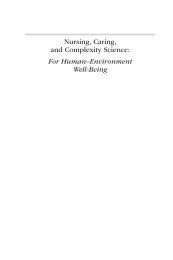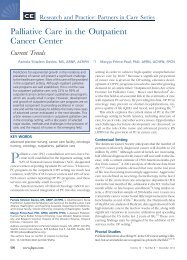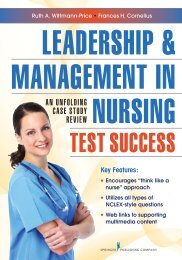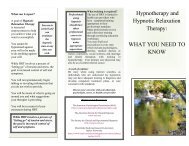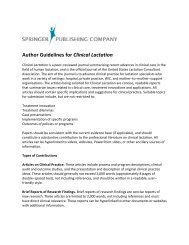Expertise in nursing practice : caring, clinical judgment - Springer ...
Expertise in nursing practice : caring, clinical judgment - Springer ...
Expertise in nursing practice : caring, clinical judgment - Springer ...
You also want an ePaper? Increase the reach of your titles
YUMPU automatically turns print PDFs into web optimized ePapers that Google loves.
Introduction xvii<br />
recognize that this cl<strong>in</strong>ical situation is a situation of heart “pump” failure<br />
or fluid depletion and then proceed to clarify the nature of the situation<br />
by further assessment.<br />
The skillful practitioner learns to hold his background understand<strong>in</strong>gs<br />
<strong>in</strong> a fluid or semipermeable way so that he can recognize when these<br />
tacit expectations are not be<strong>in</strong>g met. Like Bourdieu (1990), we found<br />
that respond<strong>in</strong>g to the situation as an “<strong>in</strong>stance of particular concerns” is<br />
central to the logic of excellent <strong>practice</strong>. Cl<strong>in</strong>ical <strong>practice</strong> occurs with<strong>in</strong> a<br />
health care team. Whereas <strong>in</strong> some skill situations, such as play<strong>in</strong>g chess<br />
or driv<strong>in</strong>g a car, experts would not need to articulate their perspectives<br />
before tak<strong>in</strong>g action, <strong>in</strong> the nurs<strong>in</strong>g profession, a case must be made that<br />
<strong>in</strong>cludes articulat<strong>in</strong>g the nurse’s perspective and evidence <strong>in</strong> order to get<br />
the appropriate physician <strong>in</strong>tervention. However, both physicians and<br />
nurses are required to make a case about their cl<strong>in</strong>ical <strong>in</strong>terpretations<br />
to other cl<strong>in</strong>icians. In emergencies, when there may be no physician<br />
available, the nurse must be able to articulate clearly the reason for us<strong>in</strong>g<br />
a stand<strong>in</strong>g order or protocol or go<strong>in</strong>g beyond the usual boundaries of<br />
usual nurs<strong>in</strong>g <strong>practice</strong>. This is expected and defensible when it is critical<br />
for the patient’s survival. Recogniz<strong>in</strong>g the unexpected—that is, when tacit<br />
global expectations of patients’ recovery are not met—is also a hallmark<br />
of expert <strong>practice</strong>. This background is essential situat<strong>in</strong>g <strong>in</strong>formation for<br />
read<strong>in</strong>g this research that extends and exam<strong>in</strong>es the previous 1984 From<br />
Novice to Expert study.<br />
We <strong>in</strong>sert a condensed account of the novice stage of skill acquisition,<br />
which typically occurs <strong>in</strong> the first year of the nurs<strong>in</strong>g student’s<br />
cl<strong>in</strong>ical education. We want to clear up any mislabel<strong>in</strong>g and misconceptions<br />
that a nurs<strong>in</strong>g student can graduate and rema<strong>in</strong> at a novice<br />
level of skill acquisition. No one can get through nurs<strong>in</strong>g school and take<br />
the NCLEX–RN (National Council Licensure Exam<strong>in</strong>ation–Registered<br />
Nurse) while rema<strong>in</strong><strong>in</strong>g a novice! We did not study undergraduate students<br />
<strong>in</strong> the 1996 study reported here. In the 1996 study, we studied only<br />
practic<strong>in</strong>g, licensed nurses. Therefore, we <strong>in</strong>clude the novice stage here<br />
for contrast to the advanced beg<strong>in</strong>ner—the newly graduated nurse <strong>in</strong> the<br />
first job:<br />
NOVICE: FIRST YEAR OF EDUCATION<br />
The novice stage of skill acquisition occurs <strong>in</strong> areas where the student<br />
has no experiential background to base approach or understand<strong>in</strong>g of the




